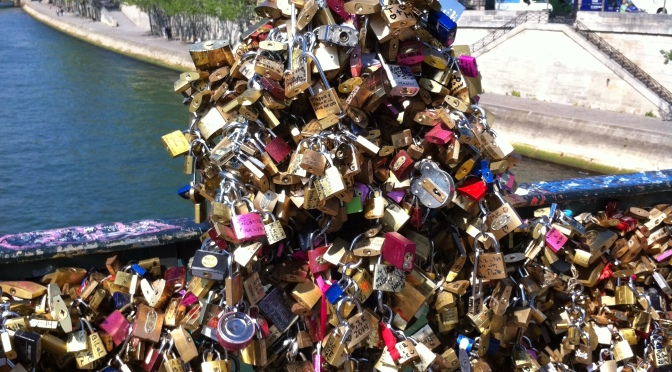One of our supporters lamented on our Facebook page that she was afraid Paris would become known as the City of Locks. As the influx of “love lockers” increases daily, you have to wonder if her fears could be justified.
The City of Light Locks
It would be plenty ironic if that were to come to pass, since France’s national holiday celebrates the storming of the Bastille—a prison. Liberté, or liberty, is the first word in the country’s motto—Liberté, Egalité, Fraternité—and it is emblazoned on many public buildings around Paris. Liberty is really important to the French, who lived under kings and dictators for far too many centuries.
“Love is not a cage!” raged Parisian Fabien T., when asked about “love locks.” “It’s not a prison! This symbol is terrible for love!”
“Love should be free,” agreed Yann L. “It’s wrong to try to lock someone to you. That’s possession. Love cannot grow that way.”
Agnès C. Poirier talked about the French philosophy of love in her op-ed about “love locks” in the New York Times (“An Affront to Love, French-Style,” 18 August 2012). “To love truly is to want the other free…Love is not about possession or property. Love is no prison where two people are each other’s slaves.” She writes of French philosopher Alain Badiou’s book, In Praise of Love, in which he tells us risk is a part of love. “There is no safe, everlasting love,” Poirier writes. “The idea that you can lock two people’s love once and for all, and toss the key, is a puerile fantasy.”
While Paris is known as the City of Love throughout the world, its other moniker, the City of Light—a place of enlightenment—is even more highly prized by the locals. Intellect, education and philosophy reign supreme, and love as a concept is deeply intellectualized, dissected, discussed at length over drinks at the café. Ask most Parisians how they feel about “love locks” and you’ll hear words like “barbaric” and “oppressive,” but even more frequently, “unenlightened.” As a symbol of love, a lock is an epic fail for Parisians: it neither illustrates the free expression of passion, nor matches up to the lofty ideal of l’amour. In other words: it’s just plain wrong.
And now, this affront to the Parisian way of thinking is installed on nearly every bridge on their home turf, flying in the face of everything they hold dear: not just the historic bridges they cherish, but the very idea of what love means.
There’s a reason diplomats spend a good deal of time researching local customs and beliefs before they visit a foreign country. One misstep could start a war. Now there are over 700,000 missteps invading Paris’s bridges, and one could argue that’s a huge declaration of war on a city where each lock is a tiny missal aimed at the heart of their culture, their heritage and their beliefs.
—Lisa Anselmo
Read more about what Parisians are saying about the locks taking over their city.


So I figure with rates as they are some have gotten divorced after doing this. Has anyone come back & unlocked the lock?
We don’t know about unlocking them but we read about one man who came back and tried to break the lock he’d left, after his divorce. But of course, if you threw the key into the Seine, you couldn’t unlock it the usual way, could you?